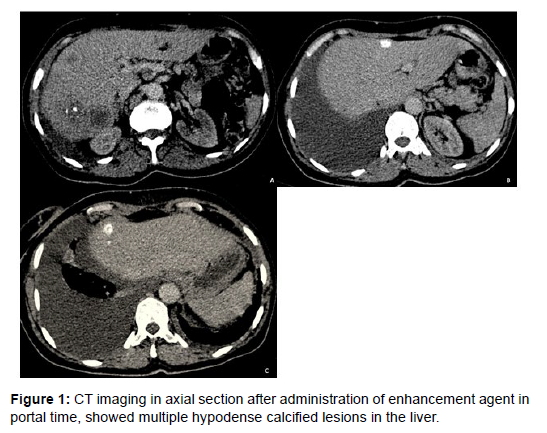Detecting Calcified Liver Metastasis in Breast Cancer
Received: 04-Apr-2023 / Manuscript No. roa-23-94423 / Editor assigned: 06-Apr-2023 / PreQC No. roa-23-94423 (PQ) / Reviewed: 20-Apr-2023 / QC No. roa-23-94423 / Revised: 22-Apr-2023 / Manuscript No. roa-23-94423 (R) / Published Date: 29-Apr-2023 DOI: 10.4172/2167-7964.1000437
Clinical Image
Calcified liver metastasis is a rare but significant finding in breast cancer patients. We present a case of calcified liver metastasis of breast cancer identified on CT imaging in a 54-year-old female with a history of breast cancer who presented with abdominal pain.
On imaging studies, calcified liver metastasis appears as a welldefined mass with punctate or linear calcifications. In our case, CT imaging after administration of enhancement agent, revealed multiple hypodense calcified lesions in the liver (Figure 1), indicating calcified liver metastasis in accordance with the patient’s clinical history. Differential diagnosis includes benign calcifications, cysts, and other types of liver metastases (Figure 1).
Treatment options for calcified liver metastasis of breast cancer include surgery, radiation therapy, and systemic therapy. Imaging plays a crucial role in monitoring treatment response and disease progression [1,2].
In conclusion, calcified liver metastasis of breast cancer is a rare but significant finding that can be detected on imaging studies. Early detection and accurate diagnosis of calcified liver metastasis can aid in the diagnosis and management of breast cancer, and can also provide important prognostic information.
References
- Wan CK, Chen LP, Chen HY, Yang SS, Hu JT (2020) Triple-negative breast cancer with calcified metastases of hepatic, portal vein and inferior vena cava: Report of a case and review of the literature. J Formos Med Assoc 119: 1431-1434.
- Shonfeld EM, Guarino AV, Bessolo RJ (1973) Calcified hepatic metastases from carcinoma of the breast. Radiology 106: 303-304.
Indexed at, Google Scholar, Crossref
Citation: Zerhari Y, Allioui S, Jerguigue H, Omor Y (2023) Detecting Calcified LiverMetastasis in Breast Cancer. OMICS J Radiol 12: 437. DOI: 10.4172/2167-7964.1000437
Copyright: © 2023 Zerhari Y, et al. This is an open-access article distributed underthe terms of the Creative Commons Attribution License, which permits unrestricteduse, distribution, and reproduction in any medium, provided the original author andsource are credited.
Select your language of interest to view the total content in your interested language
Share This Article
Open Access Journals
Article Tools
Article Usage
- Total views: 2933
- [From(publication date): 0-2023 - Nov 12, 2025]
- Breakdown by view type
- HTML page views: 1574
- PDF downloads: 1359

